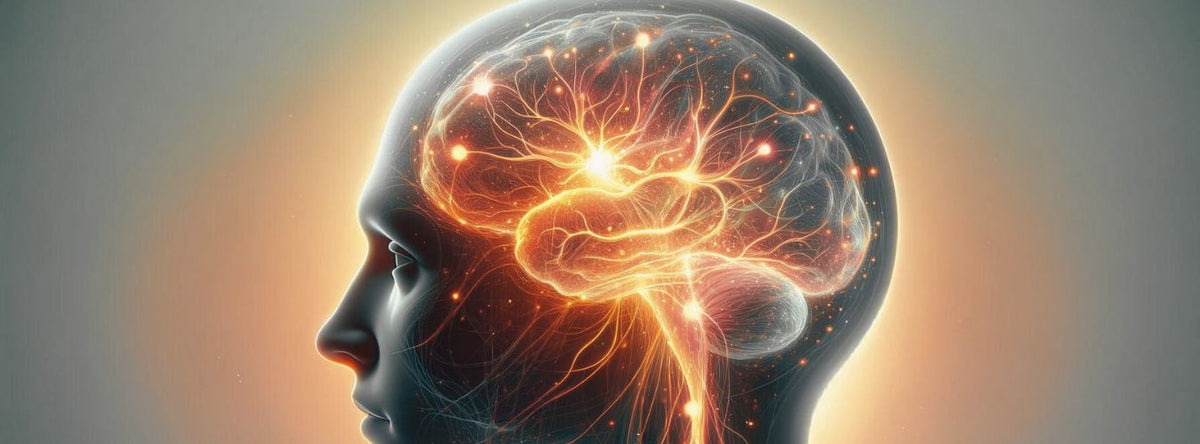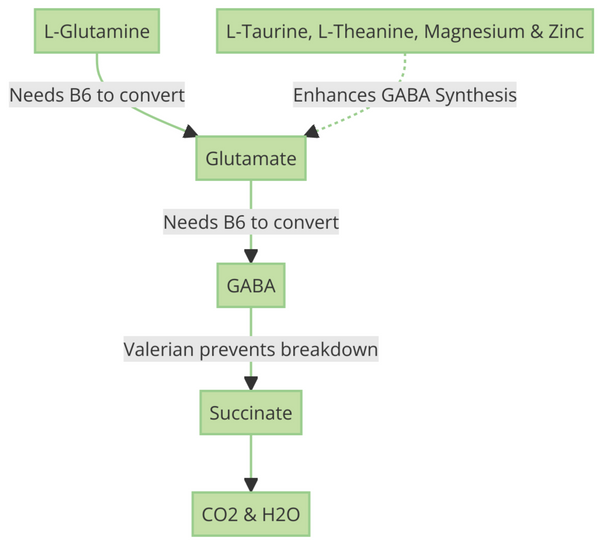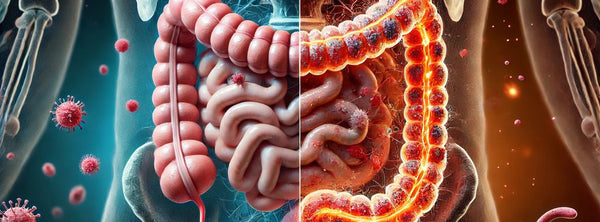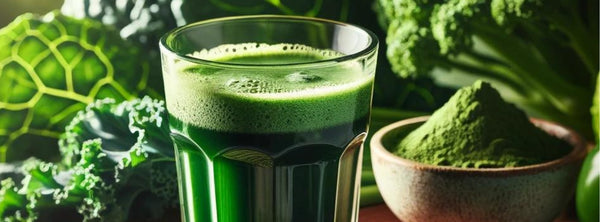
-
What is GABA?
In the bustling orchestra of our brain's neurotransmitters, where each plays a pivotal role in the symphony of our mental and emotional wellbeing, there exists a conductor named GABA, or Gamma Amino Butyric Acid. This crucial neurotransmitter takes centre stage as the body's natural pacifier, bringing a sense of calm and tranquility to the otherwise frenetic pace of our thoughts and emotions.
Imagine GABA as the gentle force that applies the brakes to the brain's excitatory impulses, particularly those sparked by its counterpart, glutamate. It's like having an internal moderator that steps in to calm the waves of anxiety and stress, ensuring they don't crash too hard against the shores of our consciousness. By engaging with benzodiazepine receptors, GABA ensures that the nerve impulses associated with stress and anxiety are kept at bay, allowing for a state of serene balance within the brain's complex ecosystem.
Yet, when GABA levels dip below their optimal threshold, the effects can ripple through our well-being like a stone tossed into a still pond. The absence of this calming influence can lead to a cascade of unwelcome symptoms ranging from anxiety [1] and panic attacks to convulsions, an overwhelming sense of stress, and even the relentless grip of insomnia. [2] Furthermore, GABA plays a crucial role beyond the confines of our mental state. It is instrumental in the digestive process, facilitating the secretion of pancreatic enzymes and insulin necessary for proper digestion and glucose absorption. A deficiency in GABA can thus lead to blood sugar abnormalities and gastrointestinal discomforts such as bloating, flatulence, and malabsorption, adding physical ailments to the list of potential concerns. [3]
Beyond its role in calming the mind and aiding digestion, GABA is a key player in the delicate dance of our brainwaves, balancing the scales between the energising beta waves and the soothing alpha waves. An excess of beta activity can thrust us into a state of heightened alertness and anxiety, disrupting our sleep and peace of mind. Alpha waves, on the other hand, serve as the bridge connecting our subconscious with our conscious awareness, fostering a state of relaxation and calm focus that is essential for both mental health and creativity. [4]
For More Information Please Click On The Tabs Above.
-
Essential Nutrients for Boosting GABA
To naturally elevate your body's GABA levels and embrace a state of calm, embracing specific key nutrients is crucial.
L-Glutamine:
This amino acid is the starting point. The body converts it into glutamate, a neurotransmitter important for alertness and cognitive function.
Vitamin B6:
Essential for converting glutamate into GABA. Low levels of B6 can hinder this process, affecting your mood and relaxation. [5]
L-Taurine:
An amino acid acts as a booster for the enzyme that converts glutamate to GABA, improving the conversion rate and potentially aiding in reducing anxiety.
Zinc:
Helps in the release of GABA from its receptors, enhancing its calming effects. Zinc along with B6 also supports the production of other neurotransmitters critical for mental health.

Expanding the GABA-Enhancing Toolkit
Following the foundational support of Vitamin B6, Zinc, L-Glutamine, and L-Taurine, several additional nutrients and herbs offer pathways to bolster GABA levels naturally, enhancing its calming effects on the brain and nervous system.
Theanine:
Exclusive to tea leaves, Theanine elevates brain GABA levels, encourages the production of soothing alpha brainwaves, and in studies, has been shown to amplify the response of GABA A receptors. Its capacity to calm the central nervous system makes it a valuable ally against anxiety, improving sleep quality and mitigating stress's harmful impacts. [6]
Glycine:
As an amino acid, Glycine enhances GABA function, offering relief from anxiety and panic by tempering noradrenaline's stimulatory effects. It also contributes to relaxation and may improve sleep issues. [7]
Magnesium:
A widespread deficiency in magnesium can directly impact mental health. Magnesium aids in activating GABA receptors, which is crucial for managing anxiety, depression, and sleep disorders. Enhancing magnesium intake could therefore support a more balanced mood and improved sleep quality. [8]
Inositol:
This vitamin-like substance may ease anxiety and depression by boosting GABA's binding efficiency to its receptors, potentially enhancing serotonin receptor sensitivity and promoting restful sleep.
Holy Basil:
Revered in Ayurvedic medicine, Holy Basil addresses anxiety, stress, and depression, marking it as a significant herb for mental wellbeing.[9]
Valerian:
Known for its sleep-inducing properties,Valerian also supports GABA modulation, reducing anxiety and stabilising GABA levels in the brain. [10]
Passionflower:
Comparable in efficacy to certain medications for anxiety, Passionflower acts on the GABA system, enhancing receptor function and GABA uptake, showcasing its potential in anxiety treatment. [11]
Chamomile:
Beyond its popular use in herbal teas, Chamomile's calming effects are attributed to apigenin, a flavonoid that interacts with GABA and benzodiazepine receptors, aiding in anxiety relief and sleep improvement. [12]
St. John's Wort:
While famous for its antidepressant properties, St John's Wort also plays a role in increasing GABA levels and activity, contributing to its calming effects. [13]
Ginkgo Biloba:
Renowned as a memory herb Ginkgo Biloba enhances GABA in the brain's hippocampus, supporting memory and cognitive functions, areas notably affected in Alzheimer's disease. [14]
For More Information Please Click On Boosting GABA Recommendations Tab Above.
-
Balancing GABA Naturally: The Role of Targeted Supplementation
It's a common thought: if you're struggling with anxiety, insomnia, or depression due to low GABA levels, why not just take a GABA supplement? While supplementing appears straightforward, the real question lies in the precise needs of your body. How much GABA is truly beneficial for you? The necessary amount can vary significantly from one individual to another, yet many find themselves reaching for a one-size-fits-all supplement solution.
The critical issue with exceeding your body's GABA requirement is the potential for adverse effects. Excess GABA can lead to unwanted outcomes such as nausea, numbness and even cognitive impairments like difficulty learning and poor memory. Moreover, too much GABA can interfere with the release of serotonin, the neurotransmitter that uplifts our mood, regulates sleep and controls appetite. This imbalance can spiral into a host of problems, including depression, anxiety, irritability, sleep disturbances and an increase in carbohydrate cravings.
Understanding the potential risks associated with imbalanced GABA supplementation sheds light on the advantages of fostering your body's ability to regulate its own GABA levels. Emphasising a nutrient-rich diet while incorporating specific, targeted supplements like NatroVital Be-Calm and NatroVital Cortisol Calm, as our Naturopath recommends at the Vitality and Wellness Centre, supports your body's natural GABA production and enhances overall nervous system health. This method leverages the body's innate mechanisms, allowing it to produce GABA at a rhythm that aligns with its unique needs. By adopting this approach, you can effectively alleviate stress and symptoms linked to low GABA levels without the risk of over-supplementation, leading to a more balanced and genuinely effective pathway to well-being.
We hope you found this blog How To Increase GABA Naturally useful and if you did please leave a comment or share on social media.
Thanks and have a great day



